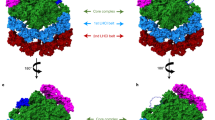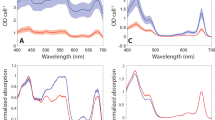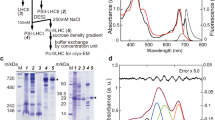Abstract
IT has recently been found that green algae can be successfully grown in 99.6 per cent deuterium oxide1. Algae such as Chlorella vulgaris and Scenedesmus obliquus adapted to deuterium oxide thus provide a source of highly deuterated organic compounds. Since the organisms grow in deuterium oxide with carbon dioxide as the sole carbon source, the cells must be equipped for photosynthetic activity even though their organic matter is constructed with deuterium in place of hydrogen.
This is a preview of subscription content, access via your institution
Access options
Subscribe to this journal
Receive 51 print issues and online access
$199.00 per year
only $3.90 per issue
Buy this article
- Purchase on Springer Link
- Instant access to full article PDF
Prices may be subject to local taxes which are calculated during checkout
Similar content being viewed by others
References
Chorney, W., Scully, N. J., Crespi, H. L., and Katz, J. J., Biochem. Biophys. Acta (in the press).
Strain, H. H., “Chloroplast Pigments and Chromatographic Analysis”, 32nd Annual Priestly Lectures (Pennsylbania State University, 1958).
Weigl, J. W., and Livingston, R., J. Amer. Chem. Soc., 75, 2173 (1953). Holt, A. S., and Jacobs, E. E., Plant Physiol., 30, 553 (1955).
Lunde, K., and Zechmeister, L., J. Amer. Chem. Soc., 77, 1647 (1955).
Author information
Authors and Affiliations
Rights and permissions
About this article
Cite this article
STRAIN, H., CRESPI, H. & KATZ, J. Choroplast Pigments of Deuterated Green Algae. Nature 184, 730–731 (1959). https://doi.org/10.1038/184730a0
Issue Date:
DOI: https://doi.org/10.1038/184730a0
Comments
By submitting a comment you agree to abide by our Terms and Community Guidelines. If you find something abusive or that does not comply with our terms or guidelines please flag it as inappropriate.



